We can stop questioning the Bumiputera equity target, as what you asked us to do. But how are we going to ensure that we reach that 30% target unless you can find a way to stop the Malays from selling what the government gives them and then secretly transferring the money overseas to buy property or to save in foreign bank accounts?
NO HOLDS BARRED
Raja Petra Kamarudin
Dear Khairy,
How are you? It’s been a long time since we last met and shared a cigar. I don’t know whether you ever make it to this part of the world but in the event you do please look me up and maybe we could shoot the breeze and have a drink or something like that. Smoking cigars is quite difficult here unless you do so outside because the UK no longer allows smoking inside the pubs or bars. However, unless we do that in summer we will find that extremely uncomfortable.
Anyway, what I want to talk to you about is your comment yesterday that no one should question the Bumiputera equity target. It is strange that you should say this because back in 1976 we too said the same. Oh, and was not 1976 the same year you were born? That means when you first emerged from your mother’s womb and first saw the light of day as a squealing newly-born baby we said exactly what, today, you are saying: don’t question the Bumiputera equity target.
I was then already 26 years old and a member of the Malay Chamber of Commerce. Later, I went on to become one of the Chamber’s central committee members. So, back when you first emerged into this world we were already fighting for what only today you are fighting for.
To be honest, however, we did question the Bumiputera equity target. You can, in fact, find my many kertas kerja (working papers) in the Malay Chamber library and archives, unless they have all been thrown away. Some of these kertas kerja were also compiled and published into books. Yes, while you were still in diapers and being breastfed (or maybe bottle-fed) by your mother we were already cracking our heads, pondering on how to help the Malays.
Now, when I say we did question the Bumiputera equity target, we did not question it from the point of view of whether it should be retained or removed. No, this would be a treacherous act because the Malays needed our help and even the Chinese and Indians agreed so. We questioned it from the point of view of it being 30%.
“Why 30%?” we asked. And may I remind you that we asked this question during the time you were born.
“Who set the figure at 30%?” we wanted to know -- although we suspected your father-in-law, Tun Abdullah Ahmad Badawi, may either know the answer or had a hand in it, seeing that he was the Secretary of the NOC at that time (so maybe the next time you have a family sit down you can pose this question and see what he says).
“Since Bumiputeras represent 60% of the country’s population why not the equity target be fixed at 60% instead of 30%?” we argued -- and no one could enlighten us and tell us why.
Finally, they admitted that 30% appeared to be a good figure and was sort of plucked from the top of the head. If it had been only 10% then the Malays would have complained that it is too low while if it had been 60% then the non-Malays would complain it is too high. So, 30% appeared to be a good and compromising figure, which both the Malays and non-Malays may not quarrel with.
In other words, we were told that there was no formula. No one sat down to work out the arithmetic and the end result of that calculation or formula revealed that 30% must be that target. It was just a convenient figure that some thought would be acceptable to all sides without a quarrel.
“But is 30% achievable?” we asked. Well, came the reply, it is just a target. It is not law. It is merely an aspiration (hasrat). We will try to work towards that figure but whether we achieve 30% or not is not as important as we have a target to aim for so that we know where we are heading.
Fair enough. We could accept that. So there is really no basis for it being 30%. It is just that 10% or 60% may upset one group or the other and that 30% is a middle-of-the-road or compromise that both sides can agree with without a quarrel. And while there is no formula for it being 30% or any guarantee that we can meet this 30% it at least allows us a target to aim for. And 30% is as good as any figure to aim for.
Another ten years passed. And by 1986 -- which by then you were ten years old and probably in standard three -- we again sat down to review the achievement (pancapaian) of this 30% and found that the target of 30% had not been met. We were told by the then Deputy Prime Minister that the pancapaian was only 19% or so.
This got us worried. We remembered the new Prime Minister, Tun Dr Mahathir Mohamad (then Datuk Seri), warning us merely four years or so earlier that the NEP would not go on forever and that by 1990 the NEP would end. “We promised the Chinese and Indians that the NEP would end in 1990,” said Dr Mahathir. “So we have to keep our promise and end it in 1990. So the Malays had better be ready to stand on their own feet without any government protection.”
I must admit that I too panicked. We called for a meeting of all Malay businessmen to discuss this matter. 1990 was not that far away. If the pancapaian is only 19% and if the NEP is going to end in 1990, what are the Malays going to do?
As I said, you were then still only in primary school. At that age you probably did not worry about all this and for sure would not have panicked like we did.
We decided to hold a two-day seminar at the Shangrila Hotel in Kuala Lumpur where we invited both the Prime Minister and Deputy Prime Minister to attend. We whacked Umno and the government. We whacked what we called the Umnoputeras (Umno people who kill other Bumiputeras). We whacked the trust agencies (such as Pernas, SEDC, etc.) that compete with Bumiputera businesses by using unfair and dirty tactics, and more.
I even whacked Bank Bumiputera Malaysia Berhad (BBMB) in my working paper and called BBMB ‘Bank Buat Melayu Bankrupt’. Basir was so angry he cancelled my RM5.7 million banking facilities and gave me 14 days to pay back all my outstanding balances in full -- plus I was blacklisted by the Ministry of Finance and barred from getting any further government contracts (you can talk to Idris Tulis about this because he and Izat Emir, etc., were two of the many victims of BBMB).
But nothing much happened after that because the entire world was in recession and the government could not help itself, let alone help the Bumiputeras. In fact, even the Chinese suffered and some such as Tan Koon Swan even went to jail.
This brought us to 1990 when the NEP was supposed to officially end. We were devastated. The 19% figure of 1986 was still 19% by 1990. This was mainly because of the long mid-1980s recession. So everything stagnated. What do we do?
We then decided to hold the Third Bumiputera Economic Congress and at the same time invite the government leaders to this congress so that the leaders and we can jointly ponder on this matter and consider how we could jointly solve the problems of the Malays. Of course, the Prime Minister, Deputy Prime Minister and entire Cabinet would be invited.
We were then summoned by Ahmad Sarji Abdul Hamid, the KSN, to attend a meeting in his office, which we did. Ahmad Sarji told us that Dr Mahathir had agreed to attend the congress but he insists that the government take over the organising of the congress instead of attending it as a mere guest. Furthermore, we were told, Dr Mahathir wants to invite the non-Malays to attend the congress.
We protested. How can non-Malays be invited to a Malay congress? There may be some very nasty things said during the congress and what would the non-Malays feel if they were present and heard all this?
Never mind, Ahmad Sarji said. It is good that the non-Malays attend so that they can hear what we say. This will give them an idea of how the Malays feel. This will also allow the non-Malays to participate in the debates so that they too can suggest how to assist the government in overcoming the problem of the Malays. Anyway, said Ahmad Sarji, the Prime Minister has made up his mind and this matter is not open for negotiations.
Reluctantly we had to agree because, as you know, once Dr Mahathir has made up his mind there is no turning back. And the congress was held with the participation of the non-Malays and with the government as co-organisers.
We lamented about the 19% pencapaian of the Bumiputeras and how, now that the NEP has ended, we will never see it touch 30%. The Minister of Trade, Rafidah Aziz, and Minister of Finance, Anwar Ibrahim, even argued on stage in front of the entire audience. It was actually quite embarrassing to see two senior ministers arguing on stage in front of all of us who sat there dumbfounded.
“The trouble with the Malays is that they are dayamaju (viable) but not dayatahan (resilient),” Rafidah chided us. “You can’t blame the government if the pancapaian is only 19% and not 30%,” screamed Rafidah. “It is the fault of the Malays and not the government,” Rafidah said.
Rafidah then explained that the government had given many Malays shares, permits, quotas, contracts, etc. The problem is, once the shares go up, the Malays sell them. If the Malays had retained or kept all the shares the government gave them, then it would be 30% instead of 19%. In fact, it may even be more than 30%.
We had no choice but to admit defeat. Rafidah was right. In fact, I too am guilty of exactly what Rafidah had said we Malays normally do. So how could we dispute what she said? Many Malays sell the shares the government gave them and secretly transfer the money overseas to buy property all over the world.
If you include all the overseas property and cash in foreign banks that the Malays own, and if you add this to their equity holdings, then we could probably see the figure touch more than 30%. But then if you ignore the overseas assets and cash of the Malays and just look at their shares in Malaysian companies, it would appear like the Malays own only 19% instead of 30%, or probably more.
There is hardly any successful or elite Malay who does not own property or cash outside Malaysia. And most of these are undeclared. So it does not reflect in the 19%. If it did then it would not be 19% but much more. It may even be more than 30%.
Realising that most of us are guilty of doing what Rafidah said we are doing, we decided to let the matter rest. The only way to establish whether the Bumiputera wealth is really 19%, or 30%, or maybe even 40%, we would need to declare all our hidden assets overseas, which no one was prepared to do.
Of course, there is one way we can solve this. And this would be whenever shares are issued to Malays you stamp it ‘non-transferable without government permission’. And even then if permission is granted the shares can only be sold to another Malay and not to a non-Malay.
In other words, these shares would be ‘Malay reservation shares’ just like how we have ‘Malay reservation land’. Therefore, just like in the case of Malay reservation land, shares allocated to Malays can only be sold to another Malay and to no one else.
But then the Malays do not want this. Malay reservation land is very much lower in value compared to freehold land because only Malays can buy Malay reservation land. If the land can be sold to non-Malays then the land value is so much higher. And this would be the same for ‘Malay reservation shares’ that can only be sold to Malays and not to non-Malays.
There would also be the problem of the stock exchange listing. There will be two sets of shares quoted on the stock exchange. The ‘freehold’ shares will be quoted at one price, which will be higher, and the ‘Malay reservation’ shares will be quoted at another price, which is lower.
Now, what happens when a RM1.00 share, which is 'freehold', is quoted at RM10.00 per share on the stock exchange while the ‘Malay reservation’ share is quoted at only RM0.80? The Chinese would make millions while the Malays would lose their pants. I, for one, would never buy a ‘Malay reservation’ share but would rather buy shares that can be sold freely on the market at a much higher price.
The important thing, however, is that once shares are issued to Malays they are 'frozen' and cannot be sold unless to another Malay. This would ensure that the 30% target can be achieved and Malays will forever own those shares. But the shares will hardly be worth more than the issue price and at times maybe even less than the issue price. But if the 30% target is the main issue then this would address the issue although in terms of real wealth there would not be much to shout about.
So you see, dear Khairy, at around the time you were born we already discussed this matter at great length. And the best brains in Malaysia at that time were not able to find a solution. We can stop questioning the Bumiputera equity target, as what you asked us to do. But how are we going to ensure that we reach that 30% target unless you can find a way to stop the Malays from selling what the government gives them and then secretly transferring the money overseas to buy property or to save in foreign bank accounts?
And please don’t say this is not happening. It is. In fact, your own family does it as well -- as do many of my Malay friends, most of whom you too personally know.
Dear Khairy, let me assure you that I will support any move of yours to address this Malay problem. But, as we discussed back in 1976 when you were first born, we need to find a solution on how to enlarge the cake so that there is more to go around and not on how to steal other people’s cake. And we also need to solve the problem of how the Malays can keep the cake and not eat it because once you eat the cake it will be gone. You just can’t eat your cake and have it as well.
I trust your Oxford education will not go to waste and that you can use the wisdom you have gained in Oxford to find a solution to a problem that many of the best brains in Malaysia were not able to solve since the day you were born back in 1976.
Yours truly,
Raja Petra Kamarudin
PS. I have some Cuban cigars in stock and will wait to meet you in London before I smoke them.




 Nazri (left) also revealed that he has attempted to explain the matter to the rulers, but to no avail.
Nazri (left) also revealed that he has attempted to explain the matter to the rulers, but to no avail. He also threw the gauntlet at the Pakatan state governments, telling them to reason with the rulers instead of blaming the federal government all the time.
He also threw the gauntlet at the Pakatan state governments, telling them to reason with the rulers instead of blaming the federal government all the time.



 By Michael Kaung - Free Malaysia Today
By Michael Kaung - Free Malaysia Today
 By Athi Shankar - Free Malaysia Today,
By Athi Shankar - Free Malaysia Today,
 Zaid, who is contesting for deputy president, called for a cohesive reform programme to be carried out within PKR to galvanise members to take an active part in the internal polls.
Zaid, who is contesting for deputy president, called for a cohesive reform programme to be carried out within PKR to galvanise members to take an active part in the internal polls.


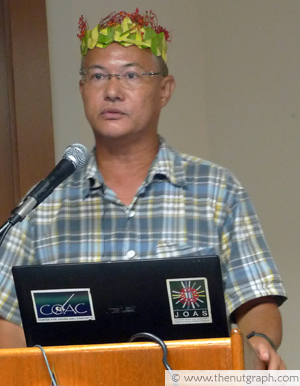
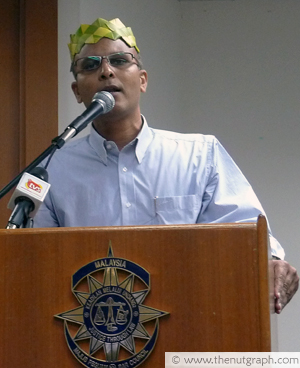

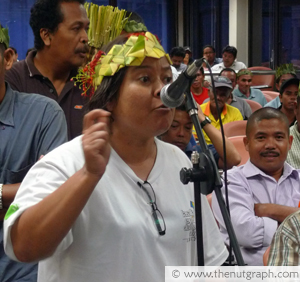




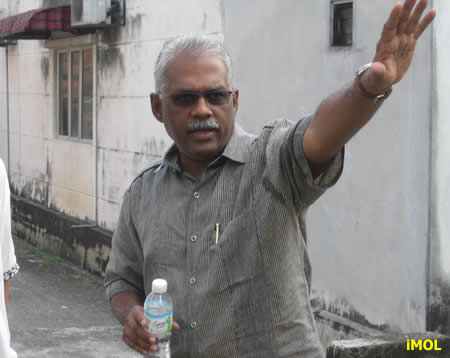

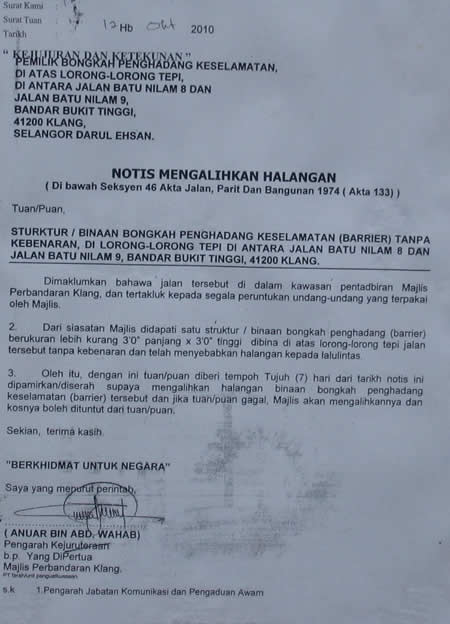

 By Athi Shankar - Free Malaysia Today
By Athi Shankar - Free Malaysia Today
 However, the idea got strayed as UDA subsequently relocated many villagers to completely transform the area into a new township. In 2008, it even declared the remaining 1,500 villagers as squatters.
However, the idea got strayed as UDA subsequently relocated many villagers to completely transform the area into a new township. In 2008, it even declared the remaining 1,500 villagers as squatters.
 (Asia Sentinel) Thanksgiving present for Obama when he arrives in Delhi in November
(Asia Sentinel) Thanksgiving present for Obama when he arrives in Delhi in November